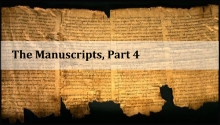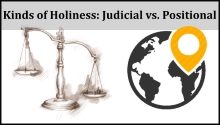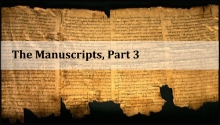
Since “holy” is usually defined as separate or set apart one would be forgiven for thinking that we must withdraw from the world to become holy. During the middle ages monks would go to extreme measures to do exactly that, moving to monasteries far removed from civilization and even forgoing talking to one another in some such retreats. On one occasion a humble monk joined just such a monastery and was told he could only speak two words one every three years. At the end of the first three years he went before the Cardinal and said, “bad food.” Three years later he returned and spoke to the Cardinal, “bad bed”.

Mourning creates conditions where the presence of God can enter in fullness and comfort and bless and heal the mourner. This is only the first reversal we see in the Sermon on the Mount. Here mourners find comfort in the knowledge that God cares for them and invites them into his healing presence. These are words every victim in Orlando need to experience. More than that, however, Christians ought to be such a blessing to mourners in their expression of the love and grace of God that they have received.

There is both a startling interest and ignorance in the 21st century church regarding spiritual growth. The interest appears to be in a field called “Spiritual Formation”, an eclectic collection of spiritual disciplines that form one’s spiritual life. The ignorance stems from the lack of understanding most Christians have in the nature of “growing up in Christ.” We go to church, read our Bible, and pray before each meal and after a while we wonder why. Is it making a difference? How can we know that we are growing in spiritual maturity and in our relationship with God?

In our exploration of objections to the preservation of the New Testament we come to a couple of passages, one very much beloved by tradition, that are of questionable origin. As we mentioned last time, there are some passages that traditionally have been included as part of the Bible that may not have been authored by the original writers. This tradition began with the very first translation efforts. For instance, the translation that King James funded and directed was based on a majority-rule style of translation. This means that the more manuscripts that read a particular way is the reading that would be preferred

The distinction between judicial holiness and positional holiness is an important one. Judicial holiness means we have never broken any part of God’s law and that we have the same holiness as God himself. Since “all have sinned and fall short of the glory of God” (Romans 3.23) our holiness, if we have any at all, is at the very least tarnished. We are guilty of breaking God’s law and, therefore, can never be judicially holy.

Not long ago a friend of mine posted on Facebook two contrasting cases of injustice. The first is the case of Lee Carol Brooker. At 75 years old, this veteran is serving a life sentence without the possibility of parole for growing 34 marijuana plants in his back yard. Certainly this is more than a person would need to grow for “personal use” though there was no indication that he was dealing the drug. Conversely, in an age where 25 states have either passed legalization laws, or are about to, the sentence seems harsh.

A couple years ago Think-Biblically published a short series on getting through tough times. In the second article we uncovered three items that constituted a process for getting through the messes life brings: Rejoice, trust Jesus and live as a citizen of heaven rather than earth. This isn’t all saint Paul has to say on the matter, however. In his letter to the Colossians he gives us a discipline to help us prepare for the hard times that eventually come to everyone. What is that discipline? Cultivating peace and gratitude.

If you read the NIV translation of the Bible you may have seen some notes attached to certain New Testament passages that state, “the earliest and most reliable translations do not contain verses…” In the NET translation you will simply notice missing verses with a footnote stating those verses do not appear in the earliest manuscripts so they have been omitted. I like the NI V’s approach better, but completely appreciate the purity of the NET editors. The question isn’t how translators handle these passages, however, the question is what’s going on with these verses and should they be included in the Bible at all.

At the church I grew up in was a member who always came dressed in the most outrageous outfits. Her socks never matched, and her clothing was always a strange mish-mash. When asked about her obviously poor ability to dress herself she replied that she always asked God what to wear, and she wore whatever he picked out. Mostly the other congregants laughed off her behavior; I cannot recall a single time anyone explored further the theology that drove her to such extreme fashions. Possibly because everyone wishes that God was that active in their lives and are a little disappointed that he isn’t.

Saturday night\early Sunday morning a Muslim man who has an ISIS profile shot up a gay nightclub in Orlando Florida killing 50 and injuring at least 53 others before police stormed the building and took out the shooter. Even well after these facts were brought to light twitter and other social media outlets were full of people blaming their favorite villains: “toxic” masculinity, homophobia, religiosity, politics, the gun culture and more. The truth is this was Islam in action. This man (and possibly others) saw a soft target in a “gun free zone” and took advantage. What can Jesus-followers do?

In our ongoing series overcoming common objections to the preservation of the New Testament we come to a forked argument. One the one hand, it is argued that Jesus is not mentioned in any official Greek or Roman documents until 112AD – 90 years after Jesus’ death – and so we only have Christian documents to verify his life and ministry which seems suspicious if Jesus was such a well-known figure. The other side of the coin is that Christianity spread rapidly, so much so that within 30 years of Jesus’s death there were churches spread all across Asia Minor making suspect the proper communication of the true gospel message.

The primary textual critic of the New Testament is Dr. Bart Ehrman, which is why we are spending time overcoming his objections. The number of textual variants in the New Testament manuscripts, as we discussed last time, are numerous. Dr. Ehrman states the number could be as high as 400,00! In truth, the number of variant readings is all determined by how one defines a variant. In Ehrman’s case it’s any difference, which is why the number is so large. Let’s look at what “variant” means and determine if there is any validity to the objection itself.
